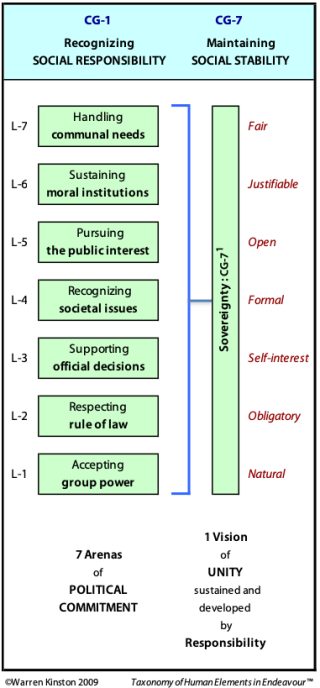Sovereignty enables Stability: CG7
Freedom from Outside Interference
The distributed to respond to the comes from wider society. But a society can only prosper where the people, despite their many differences, are able to live peacefully together.
People must actually be able to cooperate despite those inside or out preferring fraud and violence to achieve their ends.
For such a to be possible in political terms, a society requires two things:
- a centralized monopoly on the use of violence within society i.e. the government must provide for a police force and criminal justice system;
- i.e. the ability to determine its own fate and future without legal interference from outside society.i.e. the government must provide for i.e. military, intelligence and diplomatic services.
is the chief preoccupation of

Stability, peace and order can be handled politically through the government and the citizenry working in concert. Ideally, does not need to be involved internally. However, must be there as a fall-back to deal directly and decisively (but non-politically) with extreme manifestations of distress and dissatisfaction.
involves engagement with all aspects of social life, which means here the handling of all .
Most of the time (and in the absence of civil disorder) people go about activities of all sorts non-reflectively and unquestioningly. This taken-for-granted, spontaneous functioning, called «mass action» constitutes the stable social order that feels natural to all. Read more.
So the of a society is based on simultaneously engaging with all .
Unavoidable current are regarded as natural; if geographical, differences do not provoke urges to secede; if socio-economic, differences do not provoke turmoil and violence.
in a sovereign society will be accepted and respected as obligatory for all—and not subject to external powers or impositions.
are supported self-interestedly because society as a whole benefits by unequivocal support of its officials.
are formally recognized so that authorities can take appropriate action.
is openly pursued because clarity of values and goals is possible given the absence of any higher authority and the presence of unity.
are justifiably sustained—so enabling existing ethical standards to provide a benchmark for behaviour and keep disruptive elements at bay.
of each and all are fairly handled—because not responding to genuine diversity within a unified society feels intolerable to citizens (as well as provoking turmoil that belies unity and threatens instability).
Sovereignty
The Heptad, , reflects much of what we have discovered about . When pursuing any societal course, must enable diversity to be handled in a way that treats each and all fairly so far as is possible—whilst most remain fully aware that the powerful dominate, that corruption and injustice remain, and that many expectations of government will not be met.
Different conflict in regard to certain needs. The most to expect from groups, given such diversity, is . But that is more than enough for community life and for a viable within a sovereign society—as long as there is a sense of fairness.
therefore implies the capacity and desire for a society to change itself in the direction of more fairness in regard to personal needs.
This is less likely to occur in an authoritarian society. Even in a more mature society, the may not share this view, and so change leading to greater injustice may well occur. But such change is self-defeating in regard to unity. That is not good for because sooner or later, society is liable to split or many become resentful, perhaps to the point of abandoning for .
The danger associated with injustice emerges from the inherent duality: tension v action i.e. as tension builds up, a readiness for action builds in affected groups. Read more on the tension v action duality.
is the precondition for a that permits to deal with discontent. are also intrinsic to prosperity. Any significant general or even localized decrease in prosperity becomes stressful for all, and potentially destabilizing if severe enough.
The function of is therefore … to ensure that everyone feels sufficiently integrated and sufficiently prosperous to have a stake in society, a stake that inhibits violence as a method to force the government to change course when there is distress and discontent.
Conclusion
We commenced with the notion that is an expression of . It is now evident that political participation flows from:
- within a society, via
- the existence of , that enables
- a which means that
- fairly is possible and widely desired.
By differentiating arenas of responsibility within a sovereign society, a natural and healthy commitment to a stable society is possible for everyone—as detailed in CG1.
All possible groupings of adjacent levels have now been considered.
-
When politics fails: violence results and the State gets involved.
OR continue to...
-
Review this picture of political life.
As part of the review, I will identify some characteristic political stresses within each grouping and their resolution. (This unfolding duality is predictable by established THEE principles.) I will also draw your attention to a completely new and unexpected finding about THEE's architecture.
- Apply this analysis in different settings.
Originally posted: August-2009; Last updated: 8-Jun-2015
